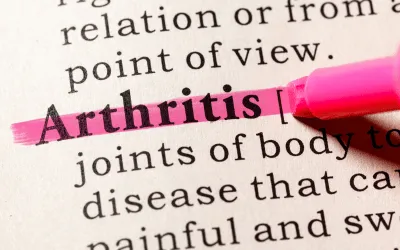About Arthritis
As the nation’s #1 cause of disability, arthritis affects nearly 60 million adults and 300,000 children. Over 100 types of arthritis and related conditions damage the joints and often other organs.
How can we assist you?
Helpful Tools for You

Understanding Biologic Therapies for Arthritis: How They Work and Who Can Benefit
Biologic therapies have revolutionized the management of arthritis, offering new hope and improved outcomes for individuals living with these conditions. In this blog post, we will explore the topic of biological therapies for arthritis, highlighting their significance in the management of arthritis and their ability to enhance the quality of life for patients. These advanced treatments have transformed the landscape of arthritis care, providing targeted and effective options for those who have not responded well to traditional medications. Let's dive in and discover how biological therapies are making a difference in the lives of arthritis patients.
What are Biologic Therapies?
Biologic therapies are targeted treatments for arthritis that differ from traditional DMARDs. They are made from living cells or organisms, and work by blocking specific proteins or immune cells involved in inflammation. This targeted approach provides more precise control over the immune response, potentially improving effectiveness and reducing side effects. Biologics are used when traditional DMARDs have not been effective or well-tolerated, offering a personalized approach to arthritis management.
How Biologic Therapies Work?
Biologics target specific proteins or immune cells involved in inflammation in arthritis. By blocking these components, they reduce joint inflammation, slow disease progression, and improve symptoms. Biologics can target the underlying causes of arthritis, leading to long-term benefits such as preserving joint structure and function. They have the potential to provide prolonged periods of remission or low disease activity, enhancing the overall quality of life for individuals with arthritis.
Conditions Treated with Biologic Therapies
Biologic therapies have shown efficacy in treating various types of arthritis and related autoimmune conditions. Some of the common conditions where biologics have been used successfully include:
Rheumatoid arthritis (RA): Biologics are widely used in the treatment of RA. They help reduce joint inflammation, slow disease progression, and improve symptoms in individuals with RA who have not responded well to traditional DMARDs.
Psoriatic arthritis (PsA): Biologics have demonstrated significant effectiveness in managing PsA, a type of arthritis that occurs in individuals with psoriasis. They target the underlying immune dysregulation seen in PsA, reducing joint inflammation and skin symptoms.
Ankylosing spondylitis (AS): Biologics have revolutionized the treatment of AS, a chronic inflammatory arthritis that primarily affects the spine and sacroiliac joints. They help control inflammation, relieve symptoms, and improve spinal mobility.
Juvenile idiopathic arthritis (JIA): Biologics have been approved for use in children with JIA, a type of arthritis that begins before the age of 16. They offer effective disease control and symptom management in pediatric patients.
In addition to these conditions, biological therapies have shown efficacy in other autoimmune conditions, such as:
Systemic lupus erythematosus (SLE): Biologics, particularly those targeting B-cells, have shown promise in managing lupus symptoms and reducing disease activity.
Spondyloarthritis: Biologics have been effective in treating various forms of spondyloarthritis, including non-radiographic axial spondyloarthritis and peripheral spondyloarthritis.
Inflammatory bowel disease (IBD): Biologics are commonly used to manage the joint inflammation associated with IBD, such as Crohn's disease and ulcerative colitis.
Psoriasis: Biologic therapies have been successful in treating moderate to severe psoriasis, a chronic skin condition characterized by inflammation and skin lesions.
It is important to note that the selection of biological therapy depends on the specific type of arthritis or autoimmune condition, as well as individual patient factors. Healthcare providers, particularly rheumatologists, can assess the disease characteristics and determine the most appropriate biologic treatment for each patient's unique situation.

Biologic therapies are considered when traditional DMARDs have been inadequate or disease activity is severe. Factors such as inadequate response, high disease activity, and functional impairment influence the decision. Treatment choices should be individualized based on disease type, severity, overall health, and patient preferences. Rheumatologists play a crucial role in assessing these factors and guiding patients toward personalized treatment decisions.
Safety and Potential Side Effects
Biologic therapies for arthritis have potential side effects and require close monitoring and regular communication with healthcare providers. Side effects may include an increased risk of infections, immune system effects, allergic reactions, injection site reactions, and specific medication-related side effects. Regular check-ups, tests, and reporting of symptoms are crucial to ensure patient safety and effective management. Open communication with healthcare providers helps address concerns and make informed treatment decisions. Adherence to the prescribed plan and active engagement with the healthcare team optimize the benefits of biological therapies while minimizing risks.
Benefits and Considerations
Biologic therapies for arthritis offer benefits such as improved disease control, reduced joint damage, and enhanced quality of life. Considerations include cost, availability, and administration methods. Affordability and access may vary, and patients should explore financial assistance options. Administration methods include self-injection or infusion, chosen based on medication, preference, and support. Regular monitoring and follow-up are necessary for optimal management. Shared decision-making with healthcare providers helps navigate considerations and select the most suitable biologic therapy.
Effects of Arthritis

Cause of Disability
In the United States, 23% of all adults, or more than 54 million people, have arthritis. It is a leading cause of work disability, with annual costs for medical care and lost earnings of $303.5 billion.

Workforce Effects
Sixty percent of US adults with arthritis are of working age (18 to 64 years). Arthritis can limit the type of work they are able to do or keep them from working at all.

Global Impact
In fact, 8 million working-age adults report that their ability to work is limited because of their arthritis. For example, they may have a hard time climbing stairs or walking from a parking deck to their workplace.
Promoting Interventions That Reduce Arthritis Pain
American Arthritis Foundation recognizes several proven approaches to reduce arthritis symptoms:
Be active. Physical activity—such as walking, bicycling, and swimming—decreases arthritis pain and improves function, mood, and quality of life. Adults with arthritis should move more and sit less throughout the day. Getting at least 150 minutes of moderate-intensity physical activity each week is recommended.
Protect your joints. People can help prevent osteoarthritis by avoiding activities that are more likely to cause joint injuries.
Talk with a doctor. Recommendations from health care providers can motivate people to be physically active and join a self-management education program. Should your arthritis be interfering with your activities of daily living you may be a candidate to receive many new treatments, and learn how to reverse the arthritis condition.


